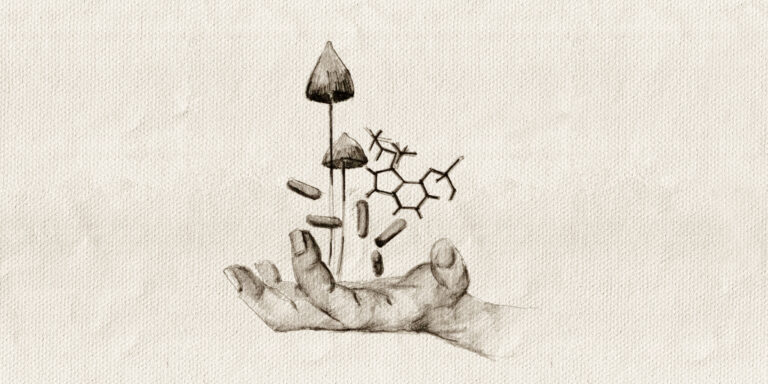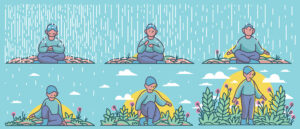In our society, death isn’t exactly a favorite topic of conversation. When someone brings it up, there’s usually a quick wish for a peaceful death in one’s sleep, and the conversation quickly moves on. Yet, the predictable outcome of life is something we encounter from a young age; it awaits us all. We can’t escape it, hide from it, or trick it; it’s an irreversible part of the cycle of life. Just as we came into this world, we will leave it.
“Nobody knows what death is, and yet everyone fears it as if they knew it was the greatest of evils, even though they don’t know.” – Plato
Setting aside the unanswered questions about what awaits us after we board Charon’s figurative ferry, the subject of death touches on other, perhaps even more painful questions: “What kind of life have we lived? Have we lived it in such a way that, while it draws to a close, we may say that it was worth it?”
In religious traditions, in various forms, we often encounter the concept of the Last Judgment. However, do we need another mythical figure to recite our metaphorical list of sins? Couldn’t we judge ourselves? Isn’t each of us our own best judge? Perhaps this is precisely why death is so taboo, as it entails reflecting on our entire lives. Everything we didn’t accomplish, places we didn’t visit, wrongs we didn’t right, relationships we didn’t mend—everything we “didn’t get around to” in life.
Imagine discovering you only have a few days, weeks, or months left. Could you cope with such a situation?
Paradigm Shift in Psychiatry
The development of global scientific trends in psychiatry in recent years suggests that we are likely on the brink of significant changes. With some audacity, we might say we stand on the threshold of a paradigm shift in psychiatry and the treatment of mental illnesses. Scientific research shows that substances, specifically psychedelics (which caused such a stir in the 1960s that they were banned by authorities), offer therapeutic potential that could fundamentally impact treatment. With their help, it’s possible to delve into the roots of the problem and subsequently work therapeutically with such findings. Studies show that using psychedelics could effectively treat conditions such as depression, anxiety, migraines, post-traumatic stress disorder, eating disorders, and many others. Moreover, they offer a certain spiritual dimension, and it is hard to deny its place in mental health treatment.
Dr. Charles L. Raison, the director of spiritual health research at Emory University in Atlanta, commented that, “People have developed varying degrees of need for spiritual support and understanding. In a way, we are connected, and it has very clear health implications.” Such a transcendence may be particularly valuable for patients in palliative care who, in addition to treatment, must also grapple with the sudden acceptance of the transience of life itself.
End-of-Life Diagnosis
Palliative care is an area that has rightfully garnered attention in recent years. Let’s be honest: we all have an interest in ensuring that this phase of care is humane and kind, allowing for a dignified departure, and more. “Palliative care isn’t here for a good death but for a good life. That’s its main mission,” mentions palliative physician Ondřej Kopecký in the film “Intensive Care Unit,” directed by Adéla Komrzý, which premiered at this year’s Karlovy Vary International Film Festival. The film aims to explain the pillars of palliative care and destigmatize its position in the public eye.
Improving the quality of life, even at its end, is one of the goals associated with the potential use of psilocybin-assisted psychotherapy in patients diagnosed with oncological disease.
PSIKET
For several years, Czech scientists from the National Institute of Mental Health have been preparing the groundwork for research that has now been officially greenlit and awaits only adequate financial support to begin. It concerns two studies named PSIKET (001 & 002). The name is a combination of the first few letters of two psychedelics, whose effects are to be compared and evaluated: psilocybin and ketamine.
Psilocybin, an alkaloid found in psychedelic mushrooms (e.g., psilocybe mushrooms), is more or less responsible for their psychoactive effects. It is officially listed as a controlled substance, classified as a drug without therapeutic use for over fifty years. However, unofficially, and science is slowly confirming this, it is considered a highly promising tool in psychotherapy for treating depression and other mental illnesses. Global experts estimate that it is only a matter of years before psilocybin becomes available for depression treatment.
Ketamine isn’t listed as a controlled substance because it’s already classified as medicine, specifically an anesthetic. It too has psychedelic properties, and for several years it has been administered off-label for the treatment of depression. Studies show it has an immediate, although short-term, antidepressant effect.
The unique design of the Czech studies involves comparing the antidepressant effects of these two psychedelic substances with an active placebo. One study focuses on patients diagnosed with depression, for whom standard treatments like antidepressants or psychotherapy simply don’t work. The other study, which we’ll delve into later in this article, targets patients diagnosed with oncological disease, usually patients in palliative care. The research will be double-blind, meaning nobody knows until the last moment whether the patient will receive psilocybin, ketamine, or a placebo. However, because patients must stop taking any medications, if they receive a placebo, they’ll have one more session.

PSIKET “Palio”
Focusing one of the studies on patients diagnosed with cancer makes sense on several levels. Research on psilocybin for patients diagnosed with cancer was conducted in 2016 by experts Roland R. Griffiths, Matthew W. Johnson, and other scientists. Their research demonstrated a significant reduction in depressive and anxious symptoms (up to 80% persisting even after six months) and a simultaneous increase in mental well-being and joy of life.
Depression is not uncommon among patients with cancer. Up to a quarter of patients struggle with it. According to the PSYRES Foundation for Psychedelic Research (www.psyres.eu),”A whole set of symptoms called ‘existential distress’ is often described in patients with cancer. It includes not only depression but also fears and anxiety, feelings of hopelessness, despair, demoralization, and, above all, fear of death. Patients often experience feeling a loss of dignity, losing the meaning of life, grief, sorrow, social isolation, or even a desire for death,” They further state that the standard treatment protocol of using antidepressants for depression accompanying oncological diseases is not very effective. The effectiveness of antidepressants is significantly lower than in classical depression, and the onset of action also takes much longer, if it occurs at all.
The use of psilocybin in such a diagnosis seems ideal for several reasons. Psilocybin offers an immediate onset of action, which is not usually encountered in the use of antidepressants and is all the more appreciated by people who do not have much time left. Normally patients prescribed antidepressants have to try several types before finding the ones that work while also having minimal side effects. Unlike antidepressants, psychotherapy seeks to identify the root of the problem, but it takes several years. Again, this is time that relentlessly diminishes in the case of patients in palliative care, like wax melting from a burning candle.
For peace of mind
Last but not least it is worth mentioning a certain “added value” of the psychedelic experience, which one might say is the core of its essence. Altered consciousness can significantly influence the perception of time and ultimateness. It also helps develop a concept of the soul and its transformation after death, and the notion that consciousness can exist outside the physical body. Such awareness can be also mediated to a person through spiritual practices, spontaneous mystical experiences, or forms of altered states of consciousness induced, for example, through breathwork. The psychedelic experience is just one of several effective tools. Moreover, the spiritual transcendence of the psychedelic experience offers not only the possibility of reconciling with death but also enhancing a sense of inner peace, which is much needed by patients whose existential distress has significantly deteriorated their quality of life.
It concerns us all
Research into this experimental form of treatment has a significant impact on several themes related to life, death, and dying. Ensuring the possibility of a dignified, peaceful, and perhaps even balanced departure for ourselves and our loved ones concerns us all. First and foremost, we need to move away from the notion that these are drugs and approach psychedelic substances as medicine. Psychedelics offer the unprecedented possibility of coping with the potential consequences of cancer, and they appear to be effective and progressive. It is essential that we all financially support this type of research because the typical source of support for medical research, pharmaceutical companies, cannot be relied upon, as they would be unable to patent the psilocybin. Anyone can contribute through the PSYRES Foundation for Psychedelic Research, which was established specifically to financially support scientific research into psychedelics.
The article was published in a slightly edited form in the December 2022 issue of the Regenerace magazine.



